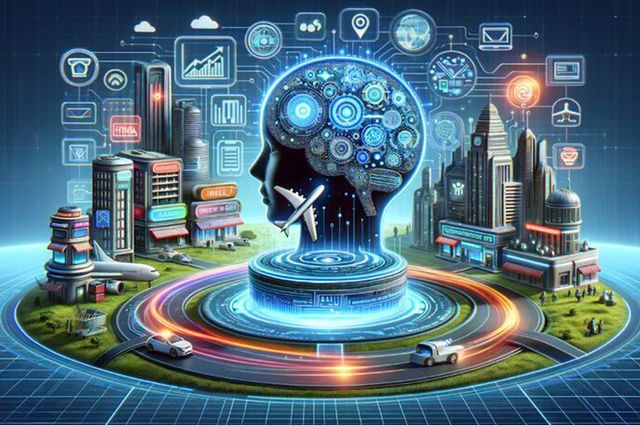Will AI Become the New UI in Travel?
13 experts shared their view
In the tourism sector, the influence of GenAI innovations on business operations is undeniable. From my theoretical standpoint, conversational platforms like ChatGPT will likely become the main or even the sole gateways to the internet. I envision a future where such platforms transition from simply processing data to becoming the primary aggregators and distributors of travel-related information. This shift could dramatically change the current structure and interface of the internet. Users may interact with the web solely through conversational AI interfaces rather than through various websites or proprietary applications. These tools can potentially develop into a kind of "superapp," similar to WeChat but with markedly different functionalities from traditional applications. We may be moving from an informational web to a generative one, switching from an HTML-based user interface to one driven by Large Language Models. How do you perceive this possible shift from an informative to a generative web? What could be the implications of moving from traditional web navigation to a model where interactions are primarily conducted through AI-driven chatbots? Does this evolution mark the end of the web as we currently know it?
I believe there will be a large shift over a long period of time. However there's a visual aspect of information that doesn't exist in a query type conversational level. Visual and sound create the emotional reaction. So generative on an "answer my question" level I think yes, but not on an inpirational level. A lot of travel still requires inspiration. Generative could put together a slideshow of images of the destination, but then it would need to be actual images, not generated images.
And the big risk is judgement, lack thereof. People will take the output as true, and single output is harder to qualify than 10 blue links of output. Even though both can be manipulated. We're going to need to teach judgement more than ever.
I agree that we're witnessing the rise of a new, AI-driven interface to the internet, which will expand but not entirely replace today's web interface. GAI chatbots are the first step, worrying Google about the future of its profitable search engine. Despite some comically inept responses from its new Generative Search Experience, it will be a better way to handle many daily inquiries once the kinks are worked out. Similar offerings from OpenAI and others will provide more GAI query options. Today, we can type requests into chatbots and receive responses in text, images, and sound. Soon, we'll have natural language conversations with photorealistic avatars, blurring the line between human and AI interactions.
What excites me now is how AI agents take this further by providing a layer on top of chatbots, dramatically extending their capabilities. Where chatbots complete tasks, agents can achieve goals across multiple tasks using multiple models and data sources. Google's Trip Planning Experience agent is an early example, planning entire itineraries based on traveler preferences with the skill of a human travel agent—all in seconds. Like a 5-year-old Mozart, it may not be impressive now, but get ready for what's coming!
In a word, no. Conversational interfaces have their place, but they would add friction to airline, hotel, and restaurant searches. Amazon some years back tried to promote and monetise voice search via its Alexa devices, but no one was interested. Alexa today is still mostly used for short interactions like "set a timer", "play a song" etc. An LLM chatbot interface might make sense in a car where your attention needs to be on the road, but even then the commands are likely to be limited to changing the temperature controls or switching the radio channels. Airline/hotel searches are intrinsically visual - photographs sell products. Also, it's much easier to slide a cost range control in Google Maps and see the hotels in a price range in a geographical view. Google has invested too much in SERPs to let it go. Current Gen AI driven itineraries have no concept of north/south/east/west, time, distances etc. LLMs don't have logic, they just parrot back popular words and phrases. By definition, they are not good with "off the beaten track" (low probability) type searches. Also, the hyperscalers will mostly list places that they can monitise. Plus ca change.
In summary, yes, I do foresee this shift.
In support of that view, technology has been taking the user further toward voice input over the last decade. Curiously, this shift is more a revolution to our most convenient form of communication - voice.
Voice prompts and interpretation are as 'old' as the earliest dictating software applications. These have been egged along by voice assistants and eventually VOIP, while listening as the globe speaks, and also actively translating.
Voice communication and input is faster, convenient and more effective than the need to type. It certainly requires less digits and limbs. While so much has advanced in terms of computing input format to cater for all persons and their individual capabilities, the main stream will relaign to voice input as we move forward.
A place will continue to exist for text input for those who either need or prefer the approach.
The major implications will be in the way that information is found. However, the major aggregators of content are already addressing this capability. Let's face it. There's a lot of money in search.
The next shift will be thought input, but's that's another topic.
Absolutely. AI is already making significant changes across various industries. Conversational technologies like AI-powered chatbots are also becoming a staple in the travel industry. For example, now, Penny, Priceline's AI-powered virtual travel assistant, helps travellers plan and book trips effortlessly. In 2024, a major upgrade expanded its capabilities to include booking flights, car rentals, and vacation packages. Similarly, in March 2024, travel company Despegar launched the GenAI-powered travel assistant Sofia, offering multimodal functionality for trip planning!
A main catalyst in this evolution is the dominance of Gen Z and Gen Alpha in guest audiences. These generations are born into and accustomed to smaller devices and generative technology. Generative platforms or superapps meet their preferences for convenience, accessibility, and speed in navigating online.
However, as internet dynamics evolve, challenges emerge, particularly regarding data privacy and compliance. The storage of sensitive and personal data on these platforms may not always align with international or regional data protection regulations like GDPR or the users' personal preferences.
There's also a growing concern about maintaining the human touch in hospitality. While AI is on its way to becoming the new travel UI, developing the Human Intelligence (HI) element will require time and continued advancements.
There is no doubt that Generative AI has transformative powers. I envision a not so distant future where people, in place of typing, will be more comfortable using genAI-powered voice assistants and chatbots to compose complex, multi-sentence prompts to find the best vacation spot, accommodations, experiences and prices.
The question is: will people use some new futuristic entry points to access genAI-provided travel information, or stick to brands that they are familiar with?
In my view, the vast majority of travelers will stick to brands they have brand affiliation with. Ex. genAI-powered voice assistants like Google Assistant, Apple's Siri and Amazon's Alexa, as well as chatbots on OTA and major travel supplier sites,As a depository of static information, genAI is ill-prepared to handle the dynamic pricing and perishable inventory availability in travel. Therefore any travel information or itinerary suggested by genAI, has to be powered by real-time ARI (Availability, Rates and Inventory) aggregators and tech platforms.
OTAs are well prepared to make bookable any AI-suggested itinerary with their 2.5 million multi room accommodation establishments, 6 million vacation rentals, 600 airlines, 250,000 local experiences, etc. So are the major travel suppliers for their own inventory: airlines, accommodations, cruises, car rentals.
AI will become the new user interface in travel but ChatGPT and the other conversational platforms will not soon replace the traditional OTAs. We shall have two ways of integrating AI into the booking process:
First, booking engines of OTAs will be integrated into conversational platforms. A customer might be able to book a trip via ChatGPT without leaving the platform that will serve as a one-stop shop for diverse activities – from creating cooking recipes, through generating photos, to writing poems and … student assignments. However, these platforms lack the professional expertise to manage the travel booking process which the OTAs have. The OTAs will provide this experience and their booking engines will be available in the conversational platforms. The OTAs will compete to be the default booking engine of the conversational platform and may pay the platform commission for each booking made through it.
Second, the GPTs can be integrated into the chatbots of OTAs to enhance their users' experience by making the conversations with the customers more humanlike.
Which of the two options will predominate? In the short term – the second option is because customers are already used to OTAs websites. In the long term, only time knows.
SiteMinder's research indicates that more than 50% of today's travellers are likely to use AI to generate accommodation recommendations – growing to over 85% among travellers from Asia.
They're big numbers, destined to rise, and are the drivers behind our partnerships with the industry's leading chatbots, price comparison and other digital marketing tools to open up the full direct booking opportunity for hoteliers. However, is this openness to AI destined to replace hotel websites or OTAs, or change anything fundamental about the internet's structure? At least in the near future, I don't believe so. The most successful travel brands have spent years understanding their users' needs and preferences – and learning how to influence those at every stage of the travel journey, through a myriad of UI choices.Whether it be via incorporating AI travel assistants, or using AI to automate a hotel's workflows and provide actionable intelligence, there's a collective readiness for AI to improve every digital moment. But speed-to-market is very different to value-to-market. I believe AI's true power lies in enabling businesses to drive meaningful innovations from the inside out, so they can be smarter and more efficient in their approaches to revenue management and operations.
The Future of AI in Hotel Tech: Balancing Innovation with Usability
Chat GPT has proven to be a remarkable door-opener for AI, showcasing stunning capabilities. However, history teaches us caution. Over the past two decades, new applications have emerged every 12 to 24 months, each promising to revolutionize the world. Few have delivered on that promise.
In hotel technology, we must prioritize usability over innovation for its own sake. Large Language Models (LLMs) are fantastic, significantly enhancing work efficiency through integration into various solutions. Yet, their impact is often diminished by misuse or misunderstanding of their proper application.
Take the example of booking a room through a chatbot. While it's a neat gimmick, it often fails to meet consumer expectations due to graphical limitations. However, incorporating a chatbot as a supplementary feature in the booking process can genuinely enhance the user experience.
With 25 years of experience in hotel tech, I've learned the importance of centering solutions around the consumer. We shouldn't chase every new trend without a critical review. Let the big hotel groups invest and experiment; if something truly works, we can adapt it. Ultimately, it's about delivering meaningful, consumer-focused innovations.
Conversational AI will redefine how we interact with technology. It’s more than just chatbots, and personally, the idea of a world dominated solely by chatbots is unsettling.
In the coming years, AI will replace traditional PMS interfaces, accessing property data via APIs through voice commands, text, and future AI-driven touchpoints we can’t yet imagine. Voice assistants already offer hands-free convenience, simplifying UIs and reducing communication channels.
AI is changing how guests and staff communicate, reducing interaction frequency while making them more focused on user needs. With more channels like WhatsApp and Instagram chat, everyone can use their preferred method to get instant answers about reservations, early check-ins, or extra services.
The future lies in AI-powered interfaces that create real-time, personalised user experiences. No more static HTML - dynamic UIs driven by AI. These UIs will learn from user interactions and offer custom suggestions in formats like voice, images, and fluid forms. This is a big improvement from current complex UIs that have all features built in, which heavily limits customization and clearly obstructs AI innovation.
To embrace AI innovations, hoteliers must ensure their technical ecosystem supports seamless AI integration. A PMS accessible via APIs is essential, centralising property data and functionalities for full integration across diverse hotel apps and digital touchpoints.
With 75% of Netflix's viewed content coming from algorithmic recommendations and Amazon's recommendation algorithm driving 35% of its sales, we're entering a "post-search" era. This trend is even more pronounced among digital natives who prefer AI-centered platforms like TikTok over traditional search engines. TikTok's algorithm, Monolith, quickly adapts to user preferences, making its content highly (creepily?) relevant and personalized. AI-driven interfaces are poised to become the new standards for digital interaction, potentially making traditional search obsolete. These AI tools could evolve into the primary aggregators and distributors of information, especially in sectors like tourism, fundamentally altering the conventional digital ecosystem from an INFORMATIONAL web to a GENERATIVE web supported by sophisticated LLMs. Today, we use multiple browsers and apps; tomorrow, we might rely on a single conversational platform integrated into devices like Rabbit's R1, earbuds, or glasses. And, as the frustrating aspects of tasks like searching, organizing, and booking are streamlined, we can focus on what truly matters: the experience.
Google's AI-organized search results will become the norm. Despite a bumpy rollout with the infamous glue-on-pizza incident, the generative web is already reshaping the travel UI. This shift holds promising implications for hotels and media outlets.
By aggregating travel content, Google could finally diminish OTAs' domination of search results, boosting direct bookings for hotels. Instead of OTAs cannibalizing existing demand with their behemoth marketing budgets ($16B spent in 2023) to appear at the top, hotels may enjoy a more prominent position in Google's AI overviews or the Knowledge Graph.
While a decline in organic traffic (and ad dollars) may pose challenges for many publishers, the shift also presents an opportunity. For those prioritizing audience building, this could be a game-changer. As savvy travelers seek unique content that generative AI can't yet provide, they will subscribe to their favorite media outlets at higher rates. This trend will fuel publishers with first-party data and income that doesn't solely rely on Google traffic for ad revenue.
The best part for hotels? Media brand subscribers who discover hotels in trusted outlets spend more, stay longer, and have higher loyalty rates, making this major shift a potential win-win for the hotels and media.
Yes, AI will be the new user interface in travel. As a result, hoteliers need to adapt their workflow to match the new characteristics that come with AI search. Already, AI-driven searches are shifting towards a more conversational approach, departing from traditional destination and date inputs. To stay relevant, hoteliers should optimize their websites and marketing strategies to align with this natural, conversational content, enhancing visibility in voice search results and attracting targeted organic traffic. AI can even help align a hotel’s marketing strategy with these new search characteristics by optimizing keyword research. AI tools can analyze vast amounts of data, including search trends, user behavior, and competitor strategies, to identify high-potential keywords. Furthermore, using AI for targeting brand keywords is crucial because it helps establish and maintain a strong online presence for hotels. As more and more search engines adopt generative AI, focusing on long-tail, more conversational, user focused keywords will bring more qualified traffic. AI tools can analyze brand sentiment, monitor online mentions, and provide insights into customer perceptions. By targeting brand keywords effectively, hotel websites appear prominently in search results when users search for their brand name. This not only increases brand visibility but also helps reputation management and driving targeted traffic to hotel websites.













